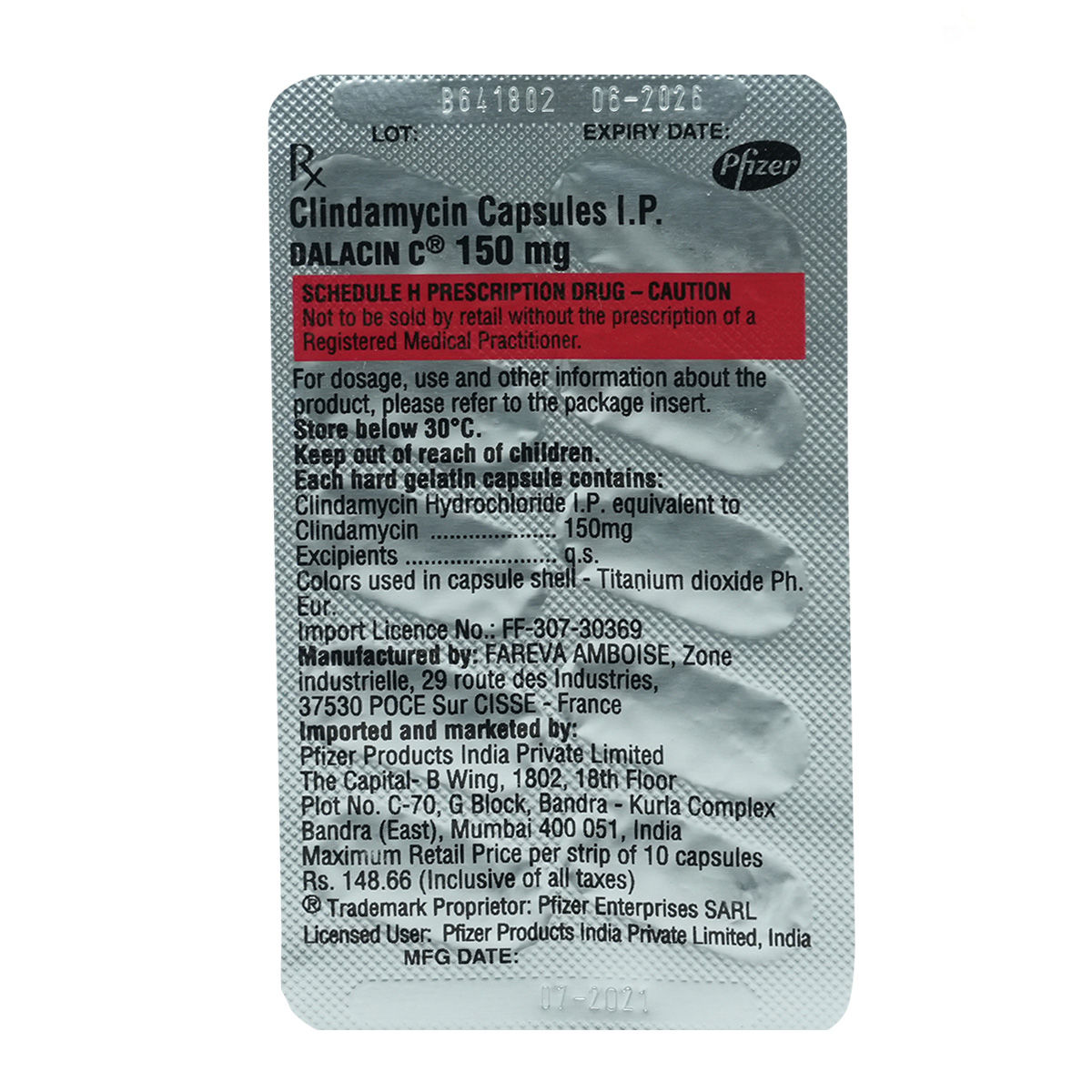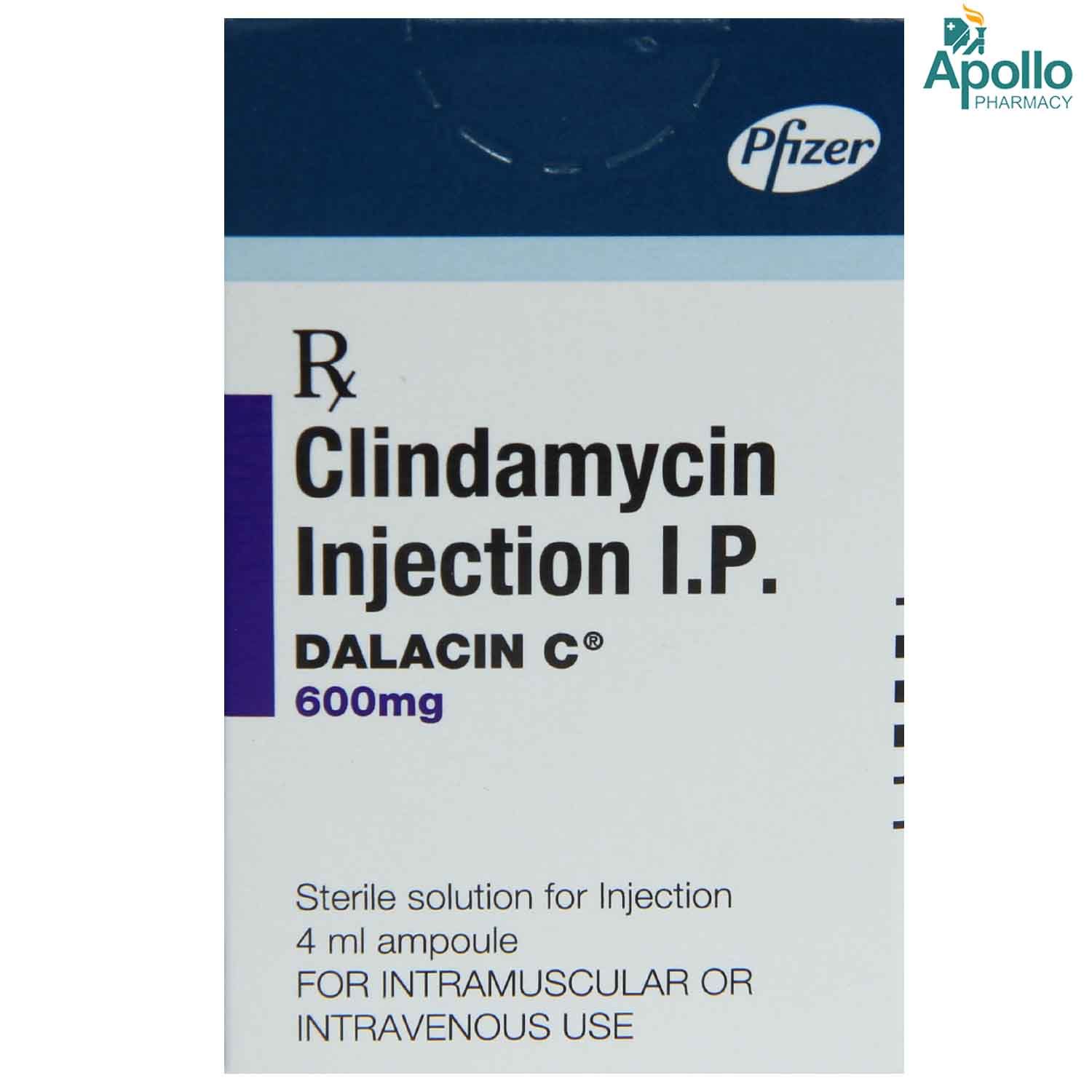Clindum-300Mg/2Ml Injection
₹135*
MRP ₹150
10% off
₹127.5*
MRP ₹150
15% CB
₹22.5 cashback(15%)
Free Delivery
With Circle membership
(Inclusive of all Taxes)
This offer price is valid on orders above ₹800. Apply coupon PHARMA10/PHARMA18 (excluding restricted items)
Know Your Delivery Time
Provide Delivery Location

Available Offers
 Prescription drug
Prescription drugWhats That

Secure Payment

India's Most Trusted Pharmacy

Genuine Products
Composition :
Manufacturer/Marketer :
Consume Type :
Return Policy :
Expires on or after :
About Clindum-300Mg/2Ml Injection
Clindum-300Mg/2Ml Injection belongs to the class of 'antibiotics', primarily used to treat serious bacterial infections such as lower respiratory tract infections like pneumonia, empyema, and lung abscess; gynaecological infections like endometritis, nongonococcal tubo-ovarian abscess, pelvic cellulitis, and postsurgical vaginal cuff infection; intra-abdominal infections; septicaemia or sepsis (blood poisoning by bacteria), and bone and joint infections. Bacterial infection occurs when harmful bacteria grow in the body and causes illness. It can infect any part of the body and multiply very quickly.
Clindum-300Mg/2Ml Injection contains 'Clindamycin' that works by preventing bacterial protein synthesis, leading to the inhibition of bacterial growth. It shows a bacteriostatic effect that stops bacterial reproduction. Clindum-300Mg/2Ml Injection effectively treats infections caused by gram-positive and anaerobic (living without air) bacteria, including susceptible strains of Staphylococcus aureus, Streptococcus pneumoniae, and Clostridium perfringens.
Clindum-300Mg/2Ml Injection will be administered by a healthcare professional. Clindum-300Mg/2Ml Injection may cause side effects, although not everybody gets them. Common side effects of Clindum-300Mg/2Ml Injection include stomach pain, nausea, vomiting, diarrhoea, heartburn, skin rash, pain and swelling at the injection site, and vaginal itching or discharge. Most of these side effects do not require medical attention and gradually resolve over time. If these side effects persist longer, please consult your doctor.
Brief your medical history to the doctor if you are allergic to any of the components in Clindum-300Mg/2Ml Injection. Let your doctor know if you have any liver disease, kidney disease, yellow food dye allergy, colitis (colon inflammation), severe stomach cramps, diarrhoea, and allergic conditions (asthma, hay fever, eczema). Do not use Clindum-300Mg/2Ml Injection while getting vaccinated with live bacterial vaccines (typhoid vaccine) since Clindum-300Mg/2Ml Injection may affect the vaccine's activity. Clindum-300Mg/2Ml Injection should be used only with a doctor's advice during pregnancy and breastfeeding.
Uses of Clindum-300Mg/2Ml Injection
Directions for Use
Medicinal Benefits
Clindum-300Mg/2Ml Injection is an antibiotic that treats severe/serious bacterial infections. It works by inhibiting bacterial protein synthesis, which inhibits bacterial growth. It shows a bacteriostatic effect, which stops bacterial reproduction but doesn't kill them. Clindum-300Mg/2Ml Injection effectively treats infections caused by gram-positive and anaerobic (living without air) bacteria, including susceptible strains of Staphylococcus aureus, Streptococcus pneumoniae, and Clostridium perfringens. Clindum-300Mg/2Ml Injection is useful in treating lower respiratory tract infections like pneumonia, empyema, and lung abscess; gynaecological infections like endometritis, nongonococcal tubo-ovarian abscess, pelvic cellulitis, and postsurgical vaginal cuff infection; intra-abdominal infections; septicaemia or sepsis (blood poisoning by bacteria), and bone and joint infections.
How Clindum-300Mg/2Ml Injection Works
Storage
Side Effects of Clindum-300Mg/2Ml Injection
- Pain and swelling at the injection site
- Stomach pain
- Nausea
- Vomiting
- Diarrhoea
- Heartburn
- Skin rash
- Vaginal itching or discharge
What if I have taken an overdose of Clindum-300Mg/2Ml Injection
Drug Warnings
Do not use Clindum-300Mg/2Ml Injection if you are allergic to any of its components. Let your doctor know if you have any liver or kidney diseases, gastrointestinal diseases (colitis, Clostridium difficile-associated diarrhoea), yellow food dye allergy, and allergic conditions (asthma, hay fever, eczema). Do not use Clindum-300Mg/2Ml Injection while getting vaccinated with live bacterial vaccines (typhoid vaccine) since Clindum-300Mg/2Ml Injection may affect the vaccine's activity. Pregnant and breastfeeding women should consult their doctor before taking Clindum-300Mg/2Ml Injection. Avoid alcohol consumption to prevent any undesired effects while using Clindum-300Mg/2Ml Injection.
Drug-Drug Interactions
Drug-Drug Interactions
Login/Sign Up
When taken in combination, Clindum-300Mg/2Ml Injection can lower the amount or action of estradiol.
How to manage the interaction:
Co-administration of Estradiol with Clindum-300Mg/2Ml Injection can result in an interaction, but it can be taken if a doctor has advised it. Do not stop using any medications without a doctor's advice.
When Ethinylestradiol and Clindum-300Mg/2Ml Injection are taken together, the effects of Clindum-300Mg/2Ml Injection can be reduced.
How to manage the interaction:
There may be a possibility of interaction between Ethinylestradiol and Clindum-300Mg/2Ml Injection, but it can be taken if prescribed by a doctor. Do not stop using any medications without a doctor's advice.
Concomitant use of Clindum-300Mg/2Ml Injection with itraconazole can reduce the metabolism and increase the levels of Clindum-300Mg/2Ml Injection in the body. This may increase the risk or severity of side effects.
How to manage the interaction:
Although there is a possible interaction, Clindum-300Mg/2Ml Injection can be taken with itraconazole if prescribed by the doctor. Consult a doctor immediately if you experience persistent vomiting, nausea, abdominal pain, or diarrhea. Do not stop using any medications without first talking to your doctor.
Co-administration of Clindum-300Mg/2Ml Injection may reduce the activity of the cholera vaccine.
How to manage the interaction:
Talk to your doctor before receiving the Cholera vaccine if you are currently being treated with Clindum-300Mg/2Ml Injection or have been treated within the last 14 days. To ensure adequate vaccine response, you should not receive cholera vaccine until at least 14 days after you complete antibiotic therapy. Do not discontinue the medication without consulting a doctor.
Concomitant use of Clindum-300Mg/2Ml Injection with ceritinib can increase the effects of Clindum-300Mg/2Ml Injection
How to manage the interaction:
Although there is a possible interaction, Clindum-300Mg/2Ml Injection can be taken with ceritinib if prescribed by the doctor. Consult the prescriber if you experience persistent vomiting, nausea, abdominal pain, or diarrhoea.
Co-administration of Boceprevir together with Clindum-300Mg/2Ml Injection can increase the effects of Clindum-300Mg/2Ml Injection.
How to manage the interaction:
Although there is a possible interaction between Clindum-300Mg/2Ml Injection and Boceprevir, you can take these medicines together if prescribed by your doctor. If you have ongoing feelings of sickness, throwing up, having loose stools, or pain in your stomach, it's important to contact your doctor right away. Do not stop using any medications without a doctor's advice.
Co-administration of Carbamazepine and Clindum-300Mg/2Ml Injection together may result in reduced blood levels of Clindum-300Mg/2Ml Injection, which could make it less effective in treating your disease.
How to manage the interaction:
Although taking carbamazepine and Clindum-300Mg/2Ml Injection together can possibly result in an interaction, it can be taken if a doctor has prescribed it. If you experience any symptoms like fever, it is advised to consult a doctor. Without consulting a doctor, never stop taking any medications.
Co-administration of Amprenavir together with Clindum-300Mg/2Ml Injection can increase the effects of Clindum-300Mg/2Ml Injection.
How to manage the interaction:
Co-administration of Clindum-300Mg/2Ml Injection with Amprenavir can possibly result in an interaction, but it can be taken if a doctor has advised it. If you have ongoing feelings of sickness, throwing up, having loose stools, or pain in your stomach, it's important to contact your doctor right away. Do not stop using any medications without talking to a doctor.
Co-administration of Clindum-300Mg/2Ml Injection with Bacitracin may increase the risk of kidney and/or nerve damage.
How to manage the interaction:
Although there is a possible interaction, Clindum-300Mg/2Ml Injection can be taken with bacitracin if prescribed by the doctor. Consult the prescriber if you experience signs and symptoms of kidney damage such as sudden weight gain or weight loss, nausea, vomiting, fluid retention, loss of appetite, increased or decreased urination, swelling, shortness of breath, muscle cramps, tiredness, weakness, dizziness, confusion, and irregular heart rhythm. Let your doctor know if you develop seizures; hearing problems; or numbness, burning or tingling in your hands and feet. If you develop diarrhoea or vomiting during treatment with these medications, drink plenty of fluids to prevent dehydration, as dehydration may harm the kidney.
Co-administration of Clindum-300Mg/2Ml Injection with Balsalazide may reduce the effectiveness of Balsalazide.
How to manage the interaction:
Although there is a possible interaction, Clindum-300Mg/2Ml Injection can be taken with balsalazide if prescribed by the doctor. Consult the prescriber if you have any concerns, the doctor may prescribe alternatives that do not interact, dose adjustment, or more frequent monitoring to safely use both medications. Do not discontinue the medication without consulting a doctor.
Drug-Food Interactions
Drug-Food Interactions
Login/Sign Up
Diet & Lifestyle Advise
- Wash your hands often to maintain cleanliness.
- Avoid sharing personal items like shaving razors.
- Include whole-grain foods like multigrain bread and brown rice in your diet.
- Taking probiotics after an antibiotic treatment reduces the risk of antibiotic-associated diarrhoea.
- Try taking yoghurt, cheese, sauerkraut, and kimchi that help restore the intestine's good bacteria.
- Include more fibre-enriched food in your diet that is easily digested by your gut bacteria. Fibre foods may also help restore healthy gut bacteria after a course of antibiotics.
- Avoid intake of alcoholic beverages as it may cause dehydration and affect your sleep.
- Manage stress, eat healthily, drink plenty of water, exercise regularly, and get plenty of sleep.
Habit Forming
Therapeutic Class
Clindum-300Mg/2Ml Injection Substitute

Dalacin C 150 Capsule 10's
₹15.09per tabletDalacin C 600 mg Injection 4 ml
₹55.88per tabletClincin 150 mg Capsule 8's
₹15.41per tabletCLID 150MG CAPSULE
₹15.44per tabletClindatime 150 Capsule 10's
₹5.94per tablet
Product Substitutes
Alcohol
Caution
Avoid taking alcohol while using Clindum-300Mg/2Ml Injection since it may worsen the side effects.
Pregnancy
Caution
Please consult your doctor before taking Clindum-300Mg/2Ml Injection if you are pregnant or planning to conceive.
Breast Feeding
Caution
Clindum-300Mg/2Ml Injection can be excreted into breast milk when used by a nursing mother. Please consult your doctor before taking Clindum-300Mg/2Ml Injection if you are breastfeeding.
Driving
Caution
There is limited data on how Clindum-300Mg/2Ml Injection affects your driving ability. Please seek medical advice for more information.
Liver
Caution
Let your doctor know if you have any history of liver diseases before taking Clindum-300Mg/2Ml Injection since it may cause jaundice and abnormal liver function tests.
Kidney
Caution
Let your doctor know if you have any history of kidney diseases before taking Clindum-300Mg/2Ml Injection.
Children
Caution
Clindum-300Mg/2Ml Injection should be used in children only when prescribed by a doctor. Your doctor will prescribe Clindum-300Mg/2Ml Injection depending on the child's age and body weight.
FAQs
Country of origin
Manufacturer/Marketer address
Disclaimer
Author Details
We provide you with authentic, trustworthy and relevant information
Reference
- https://www.webmd.com/drugs/2/drug-931/clindamycin-injection/details
- https://www.drugs.com/clindamycin.html#side-effects
- https://www.hpra.ie/img/uploaded/swedocuments/2132447.PPA1151_156_001.68048af4-da55-4413-9a20-e6d58b4c2edd.000001Clindamycin%20leaflet.140204.pdf
- https://www.accessdata.fda.gov/drugsatfda_docs/label/2008/050441s055,050639s016lbl.pdf















